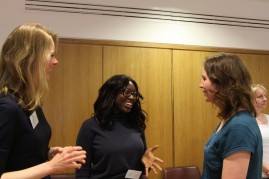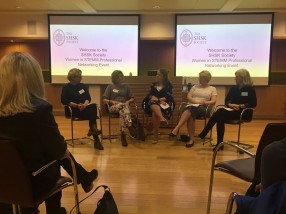Taking place at Oxford’s Saïd Business School, our Women in STEMM event was led and chaired by Old Girl Anna Britnor Guest (1986 leaver) who introduced a panel of women from the St Helen’s community all with different careers in STEMM.
Valerie Legris (current parent) conveyed her passion for working in drug diagnostics but explained how, in a previous role in oncology many of her male colleagues assumed that she was a personal assistant or HR officer purely because of her gender. Now, working in pharmacology she is pleased that the gender balance is much more even.
Rachel Buckingham (1986 leaver and former parent) works as a Paediatric Orthopaedic Consultant and Surgeon and described a typical day in one of her clinics, including some heart-warming stories of patients under her care throughout their entire childhood life. She celebrated the fact that the health sector in particular is extremely diverse in terms of backgrounds and cultures, but that it is less common for a female to work as a surgeon. Indeed, Rachel was Oxfordshire’s first ever surgeon in her speciality. When asked if she felt that she felt as though she needed to fit in with what has traditionally been a very male dominated sector within the health sector her view was:
'Because I was the minority and it was only me, I could really be who I wanted to be and not worry about fitting in with the male surgeons’.
Coastal Scientist Stephanie Hampshire (2005 leaver) offered some amusing anecdotes about when she has felt compelled to challenge issues of gender bias. On attending a conference in India, the key note speaker waxed lyrical about inspirational leaders and trail blazers in the STEMM sector; all of them male. Stephanie bravely raised a hand and asked the speaker if he could possibly mention any female STEMM role models, to which he replied after a long pause…’Mother Theresa?’ Stephanie advised that women should:
‘Never compete with one another in the sector, but collaborate and make your voices heard together’.
‘Always asking why’ is the reason Hazel Sanders (1990 leaver) believes she has been successful in her engineering career. As a civil engineer, Hazel has worked on a number of large-scale projects at airports and railways. ‘It’s not well-known that civil engineering is a great career for women’, she explained. ‘There is a huge shortage in numbers of engineers coming through the system – male and female. We will need many more engineers in the future if we are to address some of the global challenges facing us. Creating better infrastructures, coming up with innovative solutions to climate change and energy use are key. Projects such as HS2 and Crossrail need huge numbers of engineers to ensure successful outcomes.’ Hazel also championed the role that women can play in such large-scale projects.
‘Smarter designs require a more diverse and creative input, which is where women can play a vital role.’
She made the point that with fewer women in the sector, those with the passion and focus will always be the ones who stand out most.
Anna Britnor Guest originally wanted to be a journalist, but, with an accelerated pace and growth in computer and technology firms around the time when she left St Helen’s, she realised that there could be some very interesting global opportunities ahead if she chose that path.
Anna was keen to dispel some of the more negative perceptions of women in the tech sector.
‘Tech isn’t just about getting women into coding.'
'We need women to be involved in the product design and the sales side too. The tech industry needs more staff just like many of the other STEMM sectors, but employers need to be more creative and flexible to spread the net in order to get better candidates. It’s not all about having an IT or engineering degree.’

Other points raised included the feeling that employers should be doing more to address imbalances, by measuring employees on deliverables rather than the number of hours worked. Recruiters should be more open to appointing women who have more specialised or higher level qualifications which may not be an exact fit to the role advertised or where they consider they are ‘taking a risk’ on an ‘overqualified candidate’. There was a discussion about the sheer number of university courses open to students and the difficulty of making informed choices at a time of other significant teenage milestones. Discussions over flexible and part time working limitations in employment also factored into the debate, however there was a feeling that it can be easy to muddy the waters with this argument amongst other issues of attracting women into STEMM careers.

There was a general consensus by the end of what had been a fantastic evening of discussion that getting more women into leadership roles would have a positive impact on attracting more women into the sector in general. There is a magnitude of exciting opportunities for women to join STEMM industries, make a difference and enjoy a rewarding career.


